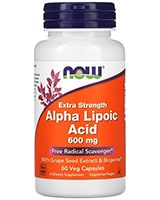

Introduction
Alpha Lipoic Acid (ALA), a compound naturally synthesized in the human body, has emerged as a focus of interest in health and wellness circles. Its dual solubility in both water and fat enables it to function effectively across various bodily environments. This article explores ten significant benefits of Alpha Lipoic Acid, emphasizing its diverse roles in health enhancement and disease management, particularly for individuals with specific health conditions or those seeking general wellness.
1. Potent Antioxidant Action
Alpha Lipoic Acid’s primary claim to fame is its robust antioxidant capability. It actively combats oxidative stress, a major contributor to aging and chronic diseases[1]Rezaei Zonooz, S., Hasani, M., Morvaridzadeh, M., Pizarro, A. B., Heydari, H., Yosaee, S., Rezamand, G., & Heshmati, J. (2021). Effect of alpha-lipoic acid on oxidative stress parameters: A systematic review and meta-analysis. Journal of Functional Foods, 87, 104774. https://doi.org/10.1016/j.jff.2021.104774. Unique among antioxidants, ALA can regenerate other antioxidants like Vitamin C and E, restoring their activity and extending their efficacy. This regenerative ability underscores ALA’s vital role in maintaining the body’s oxidative balance.
2. Cognitive Health and Neuroprotection
ALA’s impact on brain health is profound. It supports cognitive functions and offers potential benefits in the prevention and management of neurodegenerative diseases such as Alzheimer’s[2]Zhang, J., Zhao, Y., Zhang, Y., Gao, Y., Li, S., Chang, C., Gao, X., Zhao, J., & Yang, G. (2023). Alpha lipoic acid treatment in late middle age improves cognitive function: Proteomic analysis of the protective mechanisms in the hippocampus. Neuroscience Letters, 798, 137098. https://doi.org/10.1016/j.neulet.2023.137098. By protecting neurons from oxidative damage and supporting neurotransmitter function, ALA contributes to maintaining cognitive health, particularly in aging populations.
3. Diabetes Management
Alpha Lipoic Acid plays a pivotal role in diabetes management, particularly in enhancing insulin sensitivity. This enhancement can lead to better blood sugar control, a critical aspect for individuals with diabetes. Additionally, ALA has shown promise in the treatment of diabetic neuropathy, a common complication characterized by nerve damage due to high blood sugar levels. By improving nerve blood flow and reducing oxidative stress, ALA can alleviate symptoms of neuropathy, such as pain and numbness[3]Agathos, E., Tentolouris, A., Eleftheriadou, I., Katsaouni, P., Nemtzas, I., Petrou, A., Papanikolaou, C., & Tentolouris, N. (2018). Effect of α-lipoic acid on symptoms and quality of life in patients with painful diabetic neuropathy. Journal of International Medical Research, 46(5), 1779–1790. https://doi.org/10.1177/0300060518756540.
4. Weight Loss and Metabolic Syndrome
In the realm of metabolism, ALA has been observed to influence weight management and combat metabolic syndrome. It aids in modulating metabolic processes, which can contribute to weight loss and improved metabolic health[4]Namazi, N., Larijani, B., & Azadbakht, L. (2018). Alpha-lipoic acid supplement in obesity treatment: A systematic review and meta-analysis of clinical trials. Clinical Nutrition, 37(2), 419-428. https://doi.org/10.1016/j.clnu.2017.06.002. While ALA is not a standalone solution for weight loss, it can be an effective adjunct in a comprehensive weight management strategy, particularly for individuals dealing with obesity or metabolic syndrome.
5. Cardiovascular Health
Alpha Lipoic Acid contributes significantly to cardiovascular health. Its antioxidant properties aid in reducing oxidative stress, a key factor in the development of heart diseases. ALA also plays a role in improving endothelial function, which is crucial for maintaining healthy blood vessels[5]Jalilpiran, Y., Hajishafiee, M., Khorshidi, M., Rezvani, H., Mohammadi-Sartang, M., Rahmani, J., & Mousavi, S. M. (2021). The effect of Alpha-lipoic acid supplementation on endothelial function: A systematic review and meta-analysis. Phytotherapy Research, 35(5), 2386-2395. https://doi.org/10.1002/ptr.6959. This improvement can lead to better blood flow and reduced risk of atherosclerosis, thereby supporting overall heart health.
6. Skin Health and Anti-Aging
The benefits of Alpha Lipoic Acid extend to skin health and anti-aging. Its antioxidant action combats skin aging by neutralizing free radicals that can damage skin cells[6]Rahman, K. (2007). Studies on free radicals, antioxidants, and co-factors. Clinical Interventions in Aging, 2(2), 219-236. Retrieved from https://www.ncbi.nlm.nih.gov/pmc/articles/PMC2684512/. ALA also assists in diminishing fine lines, improving skin texture, and promoting a healthy glow. Moreover, its anti-inflammatory properties can help in reducing skin redness and puffiness, making it a valuable component in skincare regimens.
7. Detoxification and Heavy Metal Chelation
Alpha Lipoic Acid is recognized for its detoxification properties, particularly in chelating heavy metals from the body[7]Bjørklund, G., Aaseth, J., Crisponi, G., Rahman, M. M., & Chirumbolo, S. (2019). Insights on alpha lipoic and dihydrolipoic acids as promising scavengers of oxidative stress and possible chelators in mercury toxicology. Journal of Inorganic Biochemistry, 195, 111-119. https://doi.org/10.1016/j.jinorgbio.2019.03.019. This chelation process involves binding to and aiding in the removal of toxic metals, such as mercury and lead, which can accumulate in the body and cause various health issues. ALA’s ability to enhance the body’s detoxification pathways not only helps in heavy metal detoxification but also supports overall toxin elimination, contributing to improved health and wellness.
8. Liver Health
The liver, a vital organ for detoxification and metabolism, benefits significantly from Alpha Lipoic Acid. ALA helps protect the liver from damage due to oxidative stress and toxins. It also supports liver regeneration and can be beneficial in managing conditions like non-alcoholic fatty liver disease[8]Hosseinpour-Arjmand, S., Amirkhizi, F., & Ebrahimi-Mameghani, M. (2019). The effect of alpha-lipoic acid on inflammatory markers and body composition in obese patients with non-alcoholic fatty liver disease: A randomized, double-blind, placebo-controlled trial. Journal of Clinical Pharmacy and Therapeutics, 44(2), 258-267. https://doi.org/10.1111/jcpt.12784. By enhancing liver function, ALA plays a crucial role in maintaining overall health and supporting the body’s natural detoxification processes.
9. Immune System Support
Alpha Lipoic Acid’s role in bolstering the immune system is another key benefit. Its antioxidant properties contribute to a stronger immune defence by protecting immune cells from oxidative damage[9]Dragomanova, S., Miteva, S., Nicoletti, F., Mangano, K., Fagone, P., Pricoco, S., Staykov, H., & Tancheva, L. (2021). Therapeutic Potential of Alpha-Lipoic Acid in Viral Infections, including COVID-19. Antioxidants (Basel), 10(8), 1294. https://doi.org/10.3390/antiox10081294. This enhancement of the immune system is particularly beneficial in reducing the risk of infections and supporting overall health, especially in individuals with weakened immune systems or those looking to maintain robust health.
10. Reducing Inflammation
Inflammation is a root cause of many chronic diseases, and ALA has been shown to possess anti-inflammatory properties. By mitigating oxidative stress, ALA helps reduce the inflammatory response in the body. This reduction in inflammation can be beneficial in managing conditions like arthritis, cardiovascular diseases, and other inflammatory disorders, contributing to overall health and well-being.
Side Effects and Considerations
While Alpha Lipoic Acid is generally considered safe, it’s important to be aware of potential side effects and appropriate dosages. Common side effects, though rare, may include skin rash, itching, or gastrointestinal discomfort. The typical dosage range for ALA supplements varies, but it’s often recommended to start with a lower dose and gradually increase as needed, under medical supervision. Pregnant or breastfeeding women, children, and individuals with specific health conditions should consult healthcare professionals before starting ALA supplementation.
Conclusion
Alpha Lipoic Acid offers a multitude of health benefits, from enhancing cognitive function and managing diabetes to supporting cardiovascular health and aiding in detoxification. While it is a powerful supplement, it should be used as part of a comprehensive health strategy. Future research may uncover even more potential uses for ALA, but for now, it stands as a versatile and beneficial component of health and wellness regimens. As with any supplement, it’s crucial to consider individual health needs and consult with healthcare providers to ensure safe and effective use.
Buy Alpha Lipoic Acid Online Review Comparison Table
| Product | Company | Quantity | Price | Country | Website |
 Alpha Lipoic Acid | iHerb | 60 pills (600mg) | $13.62 |  Worldwide, AU | Visit Website >> |
References
| ↑1 | Rezaei Zonooz, S., Hasani, M., Morvaridzadeh, M., Pizarro, A. B., Heydari, H., Yosaee, S., Rezamand, G., & Heshmati, J. (2021). Effect of alpha-lipoic acid on oxidative stress parameters: A systematic review and meta-analysis. Journal of Functional Foods, 87, 104774. https://doi.org/10.1016/j.jff.2021.104774 |
|---|---|
| ↑2 | Zhang, J., Zhao, Y., Zhang, Y., Gao, Y., Li, S., Chang, C., Gao, X., Zhao, J., & Yang, G. (2023). Alpha lipoic acid treatment in late middle age improves cognitive function: Proteomic analysis of the protective mechanisms in the hippocampus. Neuroscience Letters, 798, 137098. https://doi.org/10.1016/j.neulet.2023.137098 |
| ↑3 | Agathos, E., Tentolouris, A., Eleftheriadou, I., Katsaouni, P., Nemtzas, I., Petrou, A., Papanikolaou, C., & Tentolouris, N. (2018). Effect of α-lipoic acid on symptoms and quality of life in patients with painful diabetic neuropathy. Journal of International Medical Research, 46(5), 1779–1790. https://doi.org/10.1177/0300060518756540 |
| ↑4 | Namazi, N., Larijani, B., & Azadbakht, L. (2018). Alpha-lipoic acid supplement in obesity treatment: A systematic review and meta-analysis of clinical trials. Clinical Nutrition, 37(2), 419-428. https://doi.org/10.1016/j.clnu.2017.06.002 |
| ↑5 | Jalilpiran, Y., Hajishafiee, M., Khorshidi, M., Rezvani, H., Mohammadi-Sartang, M., Rahmani, J., & Mousavi, S. M. (2021). The effect of Alpha-lipoic acid supplementation on endothelial function: A systematic review and meta-analysis. Phytotherapy Research, 35(5), 2386-2395. https://doi.org/10.1002/ptr.6959 |
| ↑6 | Rahman, K. (2007). Studies on free radicals, antioxidants, and co-factors. Clinical Interventions in Aging, 2(2), 219-236. Retrieved from https://www.ncbi.nlm.nih.gov/pmc/articles/PMC2684512/ |
| ↑7 | Bjørklund, G., Aaseth, J., Crisponi, G., Rahman, M. M., & Chirumbolo, S. (2019). Insights on alpha lipoic and dihydrolipoic acids as promising scavengers of oxidative stress and possible chelators in mercury toxicology. Journal of Inorganic Biochemistry, 195, 111-119. https://doi.org/10.1016/j.jinorgbio.2019.03.019 |
| ↑8 | Hosseinpour-Arjmand, S., Amirkhizi, F., & Ebrahimi-Mameghani, M. (2019). The effect of alpha-lipoic acid on inflammatory markers and body composition in obese patients with non-alcoholic fatty liver disease: A randomized, double-blind, placebo-controlled trial. Journal of Clinical Pharmacy and Therapeutics, 44(2), 258-267. https://doi.org/10.1111/jcpt.12784 |
| ↑9 | Dragomanova, S., Miteva, S., Nicoletti, F., Mangano, K., Fagone, P., Pricoco, S., Staykov, H., & Tancheva, L. (2021). Therapeutic Potential of Alpha-Lipoic Acid in Viral Infections, including COVID-19. Antioxidants (Basel), 10(8), 1294. https://doi.org/10.3390/antiox10081294 |

Leave a Reply